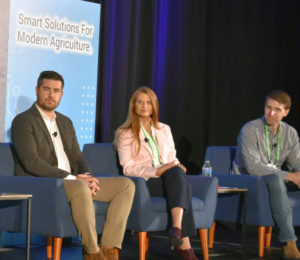Brad McDonald, an Iowa farmer and Chief Operating Officer of Continuum Ag, talked about how incentives for adopting regenerative agriculture practices such as cover crops and no till to lower CI scores could generate a new revenue stream for farmers who sell grain to ethanol plants.
“So us as farmers can help the ethanol industry lower their CI score by producing a low CI grain. How do we do it? By using cover crops, no-till, and manure instead of synthetics. If you do those three things, that’s the trifecta to lower your score,” McDonald said. “And now I’m providing a brand new value to the ethanol industry that I should be compensated for. So at the end of the day it’s all tied to what is your actual score of the practices that you’re implementing on your farm.”
Scott Henry who farms in Nevada, Iowa, shared that he’s interested in technology that helps him simplify. “Whether it be carbon intensity scores or certain practices and products that help us reduce reliance upon synthetics that are out there….where we’re trying to really focus our operation is if we can simplify things on the farm and so that would that’s first and foremost.”
Other breakout sessions and roundtable discussions at the conference focused on ways ag tech companies can help farmers adopt these practices that could start generating a premium for their crop starting in 2025.


